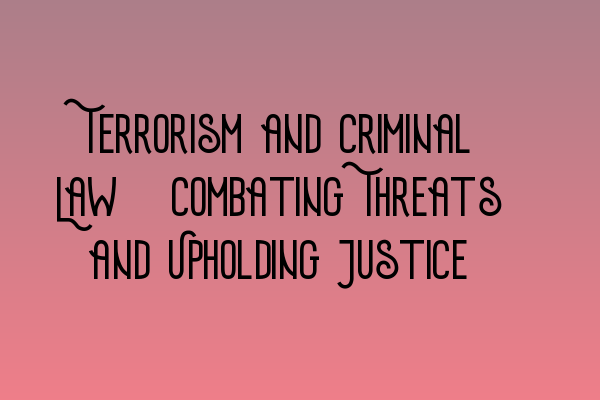Terrorism and Criminal Law: Combating Threats and Upholding Justice
As the world grapples with the ever-present threat of terrorism, criminal law plays a crucial role in combating these threats and upholding justice. Terrorism is a heinous crime that poses a significant risk to the safety and security of nations, their citizens, and the global community at large. In this blog post, we will explore the intersection of terrorism and criminal law, examining the measures taken to prevent and investigate acts of terror, prosecute offenders, and ensure justice is served.
Preventing Acts of Terrorism
Prevention is key when it comes to combating terrorism, and criminal law provides a framework for implementing preventive measures. Law enforcement agencies work tirelessly to gather intelligence, identify potential threats, and disrupt terrorist activities before they can be carried out. These preventative efforts rely on a combination of proactive investigations, information sharing, and community engagement.
One crucial aspect of preventing acts of terrorism is the gathering and analysis of intelligence. Intelligence agencies, such as MI5, play a vital role in monitoring and assessing potential threats. The information they gather enables law enforcement agencies to target their investigations and prevent acts of terror. For more information on intelligence gathering and its role in preventing terrorism, check out our article on SQE 1 Practice Exam Questions.
Community engagement is another essential element in preventing acts of terrorism. Building trust and cooperation between law enforcement agencies and communities helps identify and address radicalization factors that can lead individuals down the path of terrorism. By fostering a sense of belonging, inclusion, and shared responsibility, communities can act as a powerful force against terrorism. To learn more about the importance of community engagement in preventing terrorism, read our article on SQE 1 Practice Mocks FLK1 FLK2.
Investigating Acts of Terrorism
When acts of terrorism do occur, thorough and prompt investigations are essential to identify the perpetrators, gather evidence, and bring them to justice. Terrorism investigations often require specialized knowledge and expertise due to the complex nature of these crimes. Law enforcement agencies work in collaboration with intelligence agencies, forensic experts, and other relevant parties to ensure a comprehensive and effective investigation.
The collection and preservation of evidence are critical aspects of a terrorism investigation. Forensic techniques, such as DNA analysis and fingerprint matching, play a crucial role in determining the identities of those involved in terrorist activities. For more information on the role of forensic science in terrorism investigations, take a look at our article on SQE 2 Preparation Courses.
Additionally, international cooperation is vital in investigating acts of terrorism, as terrorists often operate across borders. Collaboration between law enforcement agencies from different countries allows for the sharing of intelligence, extradition of suspects, and coordination of efforts to disrupt terrorist networks. For more information on international cooperation in counter-terrorism measures, read our article on SQE 1 Preparation Courses.
Prosecuting and Ensuring Justice
Once suspects have been identified and evidence has been gathered, the next step is to prosecute those responsible for acts of terrorism. Criminal law provides the legal framework for holding terrorists accountable for their actions and ensuring justice is served.
Prosecuting acts of terrorism requires a comprehensive understanding of criminal law, including relevant statutes, precedents, and legal procedures. Specialized prosecutors with expertise in counter-terrorism laws play a crucial role in presenting the evidence and securing convictions. For more information on the role of prosecutors in counter-terrorism cases, check out our article on SQE 2 Preparation Courses.
Additionally, the sentencing of convicted terrorists must reflect the severity and impact of their actions. A balance must be struck between punitive measures and considerations of rehabilitation and prevention. Sentencing decisions in terrorism cases often involve complex considerations and require careful deliberation. To stay up-to-date with the latest SRA SQE exam dates, visit our article on SRA SQE Exam Dates.
Conclusion
In conclusion, terrorism represents an ongoing threat that requires a multi-faceted and comprehensive response. Criminal law plays a central role in combating terrorism by preventing acts of terror, investigating offenses, and ensuring justice is served. Through intelligence gathering, community engagement, thorough investigations, and effective prosecution, we can strive towards a safer and more just society.
